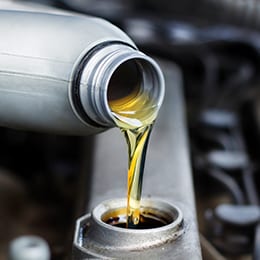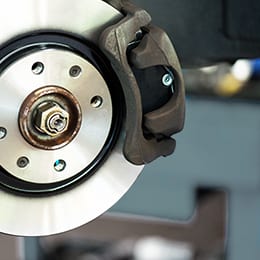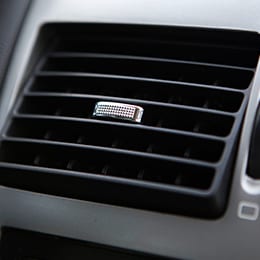List of Fluids In a Car:
- Engine Oil
- Transmission Fluid
- Power Steering Fluid
- Brake Fluid
- Engine Coolant
- Differential Fluid
- Windshield Wiper Fluid
Transmission Fluid Replacement
The transmission delivers power to the wheels so that your vehicle can travel at varying speeds. Transmission fluid prevents overheating, improves gear operation, and can help improve fuel efficiency. Aged and contaminated transmission fluid loses its effectiveness, causing your transmission to get overheated and may cause failure.
Transmission fluid can be replaced in one of two ways. One method is to drop the transmission pan where the filter can also be replaced (if applicable) and add fluid to the transmission. This service, however, only replaces about 30% of fluid that the transmission uses, leaving most of the spent transmission fluid in the vehicle. This is because transmission fluid is a hydraulic fluid and doesn’t drain into a storage area, when the vehicle is off, for use later like engine oil would.
The second, and most recommended way to replace transmission fluid is by a fluid exchange, also known as a flush. This service intercepts the transmission cooler allowing it to pump the transmission fluid into a machine. The exchange machine then measures and pumps new, fresh fluid into the transmission. By performing this service, all fluid and the oil transmission filter is removed and replaced.
Brake Fluid Replacement/Brake Flush
Brake fluid is a crucial component in the braking system. Brake fluid aids in the braking process, prompting the pads to clamp down on rotors to slow or stop your vehicle. Brake fluid is hygroscopic, meaning it attracts moisture from the air. Too much moisture or a leak in the braking system can severely affect your vehicle’s ability to slow down or stop. A brake system flush will help to remove any unwanted moisture from the system.
When brake fluid is replaced in the hydraulic braking system, a special brake fluid exchange machine is used. The machine mounts to the fluid reservoir that forces new fluid into all corners of the system. Brake fluid replacement is complete once all of the old fluid is pumped out and new fluid begins flowing through all four calipers. Most vehicles today also require a special ABS bleed procedure that is included in the service.
Power Steering Fluid Change
Power steering fluid is a hydraulic fluid that is crucial in the steering-assist process. The power steering pump circulates the fluid that forces a piston within the steering gear to move, that greatly reduces the effort needed to turn the vehicle. This process generates an incredible amount of heat. Most power steering systems lack filtration and with time and use the fluid becomes contaminated.
The power steering system recirculates the fluid through a reservoir. A specialized power steering flush machine intercepts the fluid reservoir to evacuate the old fluid while new fluid is added to the system. The service is complete once the fluid returns to a clean, golden state.
Frequently Asked Questions About Auto Fluids
Q: How often do I need to replace brake fluid?
A: Based on our severe climate in Arizona, we recommend replacing brake fluid every 2 years or 24,000 miles, whichever comes first, as well as whenever brake services are performed.
Q: How often do I need to replace transmission fluid?
A: To keep your transmission shifting seamlessly and prevent major repairs, we recommend getting a transmission flush every 30,000 miles.
Q: How often do I need to replace power steering fluid?
A: Most vehicle manufacturers do not have a service interval for this service as it is often serviced based on condition. However, automotive fluid manufacturers recommend replacing the fluid every 30,000 miles.
Q: How often do I need to replace windshield wiper fluid?
A: Replacement of windshield wiper fluid can vary based on use and climate. Windshield wiper fluid should be topped off during an oil change service. If you live in particularly cold climates where below freezing temperatures are common, it is recommended to replace the fluid with a specialty blend that lowers the freezing point of the fluid.
Q: How much to replace fluids in a car?
A: Every vehicle manufacturer uses different fluid recommendations and capacities resulting in varying costs. Consult with an automotive specialist to determine the costs of fluid replacements, and when they are needed, for your specific vehicle.




